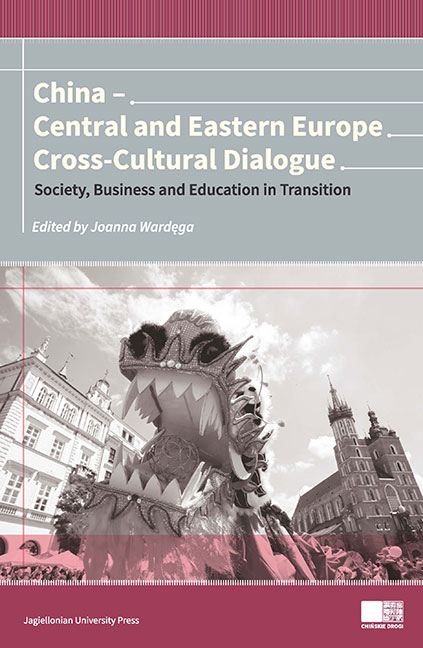Book contents
- Frontmatter
- Contents
- Foreword
- PART I Society and Culture in Transition
- PART TWO Economy and Markets in Transition
- Chinese Economic Influence on the Central and Eastern Europe Countries
- The New Silk Road and its Geopolitical Consequences for Poland
- Comparing Chinese, Japanese and South Korean FDI in Central and Eastern Europe
- Partnership through Investment – Chinese Foreign Direct Investment in CEE Countries
- Chinese Foreign Direct Investments in Europe. The Polish Case
- Fourteen EU States Already in, Japan and USA Still not Interested – What Lies Behind China-led AIIB?
- What Can CEE and China Learn from Each Other in Innovation?
- Comparison of Telecommunications Development Pattern in China and the Republic of Macedonia
- Development of Chinese Mobile Phone Game Market as an Export Opportunity for CEE Mobile Game Producers
- PART THREE Education in Transition
- Contributors
Partnership through Investment – Chinese Foreign Direct Investment in CEE Countries
from PART TWO - Economy and Markets in Transition
Published online by Cambridge University Press: 22 December 2017
- Frontmatter
- Contents
- Foreword
- PART I Society and Culture in Transition
- PART TWO Economy and Markets in Transition
- Chinese Economic Influence on the Central and Eastern Europe Countries
- The New Silk Road and its Geopolitical Consequences for Poland
- Comparing Chinese, Japanese and South Korean FDI in Central and Eastern Europe
- Partnership through Investment – Chinese Foreign Direct Investment in CEE Countries
- Chinese Foreign Direct Investments in Europe. The Polish Case
- Fourteen EU States Already in, Japan and USA Still not Interested – What Lies Behind China-led AIIB?
- What Can CEE and China Learn from Each Other in Innovation?
- Comparison of Telecommunications Development Pattern in China and the Republic of Macedonia
- Development of Chinese Mobile Phone Game Market as an Export Opportunity for CEE Mobile Game Producers
- PART THREE Education in Transition
- Contributors
Summary
China's accession to the World Trade Organization (WTO) in 2001 was the impetus for the creation of a new economic power and the search for new directions in foreign economic policy of this country. Simultaneously, the change of political and economic conditions in the global economy in the XXI century, and especially the outburst of the global economic crisis 2007/2008+, contributed to the increase in interest from the Chinese central authorities to energize diplomatic relations and the development of economic cooperation with the countries of Central and Eastern Europe (CEE). During his visit in Warsaw in April 2012, at the Economic Forum ‘Poland – Eastern Europe – China’, the then Chinese Premier Wen Jiabao, emphasized the growing importance of multi-faceted and longterm cooperative and financial relations with sixteen countries in CEE, as a source of potential economic benefits for all parties involved.
Foreign economic policy of China, due to the economic slowdown in the G3 countries, will concentrate on actively seeking partners in the markets of developing countries, including Central and Eastern Europe. What is worth mentioning, is that the multi-faceted efforts to establish contacts with developing countries from different regions of the world is evident in China's economic strategy since the beginning of the XXI century. This is reflected in rising of Chinese investment turnover with those countries. It should also be noted, that the Chinese people perceive Central Europe as a separate region, which is not a part of the German or Russian sphere of influence. This trend should be used in building relations with Beijing. It is a fact that China prefers the bilateral relations activities, rather than multilateral, and it should be taken into account (Clegg & Voss, 2012, p. 11).
The aim of the article is to present the involvement of China in the CEE region through their foreign direct investment. On the one hand, Prime Minister Wen Jiabao's visit and the strategy of cooperation with the Central European region presented by him, on the other hand, the increasing importance of the region, contributed to the exploration of this very issue in the article. In addition, the article attempts to identify future directions of cooperation between CEE and China, which directly affects foreign economic policy currently pursued by the Chinese authorities.
- Type
- Chapter
- Information
- China - Central and Eastern Europe Cross-Cultural Dialogue Society, Business and Education in Transition , pp. 213 - 228Publisher: Jagiellonian University PressPrint publication year: 2016

